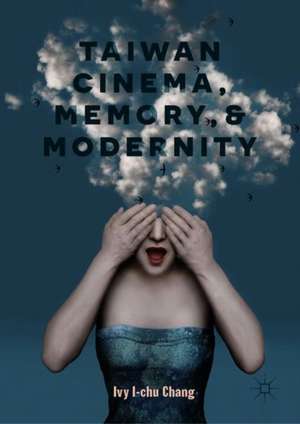Taiwan Cinema, Memory, and Modernity
Autor Ivy I-chu Changen Limba Engleză Hardback – 16 ian 2019
Preț: 582.71 lei
Preț vechi: 685.53 lei
-15% Nou
Puncte Express: 874
Preț estimativ în valută:
111.57€ • 114.45$ • 93.93£
111.57€ • 114.45$ • 93.93£
Carte tipărită la comandă
Livrare economică 26 februarie-12 martie
Preluare comenzi: 021 569.72.76
Specificații
ISBN-13: 9789811335662
ISBN-10: 9811335664
Pagini: 212
Ilustrații: XVI, 279 p. 46 illus., 43 illus. in color.
Dimensiuni: 148 x 210 x 19 mm
Greutate: 0.5 kg
Ediția:1st ed. 2019
Editura: Springer Nature Singapore
Colecția Palgrave Macmillan
Locul publicării:Singapore, Singapore
ISBN-10: 9811335664
Pagini: 212
Ilustrații: XVI, 279 p. 46 illus., 43 illus. in color.
Dimensiuni: 148 x 210 x 19 mm
Greutate: 0.5 kg
Ediția:1st ed. 2019
Editura: Springer Nature Singapore
Colecția Palgrave Macmillan
Locul publicării:Singapore, Singapore
Cuprins
Introduction.- The Visible and the Invisible: Edward Yong’s Taipei Trilogy.- The Ruin, Body, and Time-image in Tsai Ming-Liang’s Films: The Wayward Cloud, What Time Is It There, and I Don’t Want to Sleep Alone.- Colonial Reminiscence, Japanophilia Trend, and Taiwanese Grassroots Imagination in Cape No. 7.- Mourning Love: Queer Performativity and Transformation in Zero Chou’s Spider Lilies and Splendid Float.- Aesthetics of Violence and Elegy for the Young: Chang Tsuo-chi’s Gang Trilogy.- Repressed Memories and the Unhomely in Chung Mong-hong's Children Trilogy.
Recenzii
“The book is a crucial and very welcome examination of a film industry … . the main strengths of this book is the author’s ability to amalgamate the complex deconstruction of film style, paying close attention to cinematography, composition, editing, and narrative, with that of the wider geopolitical complexities of Taiwan’s hybrid cultural landscape.” (Mary J. Ainslie, International Journal of Taiwan Studies, Vol. 4 (2), 2021)
Notă biografică
Ivy I-chu Chang is Professor and the former provost of National Chiao Tung University, Taiwan. She was a visiting scholar and Fulbright scholar at New York University in 2006 and 2011-12, a recipient of MOST Grant (1997-2019), Mackay Canadian Studies Award, and Asian Cultural Council Award. She is the co-editor and chapter contributor of a book, Transnational Performance, Identity, and Mobility in Asia (Palgrave, 2018) and is the author of such monographs as Queer Performativity and Performance (2010); and Global Time-Space, Bodies and Memories: Taiwan New Cinema and its Influence (2015).
Textul de pe ultima copertă
This book investigates the aesthetics and politics of Post/Taiwan-New-Cinema by examining fifteen movies by six directors and frequent award winners in international film festivals. The book considers the works of such prominent directors as Edward Yang, Tsai Ming-liang and Chang Tsuo-chi and their influence on Asian films, as well as emergent phenomenal directors such as Wei Te-sheng, Zero Chou, and Chung Mong-hong. It also explores the possibility of transnational and trans-local social sphere in the interstices of layered colonial legacies, nation-state domination, and global capitalism. Considering Taiwan cinema in the wake of globalization, it analyses how these films represent the socio-political transition among multiple colonial legacies, global capitalism, and the changing cross-strait relation between Taiwan and the Mainland China. The book discusses how these films represent nomadic urban middle class, displaced transnational migrant workers, roaming children and young gangsters, and explores how the continuity/disjuncture of globalization has not only carved into historical and personal memories and individual bodies, but also influenced the transnational production modes and marketing strategies of cinema.
Caracteristici
Examines contemporary Taiwanese cinema and its place within both Asia and the wider film making world Analyses how these films represent the socio-political transition in the changing cross-strait relation between Taiwan and Mainland China Discusses how these films represent nomadic unban middle class, displaced transnational migrant workers, perplexed sexual dissidents in anticipating a transnational social sphere connecting Taiwan, Asia, and global Chinese communities
